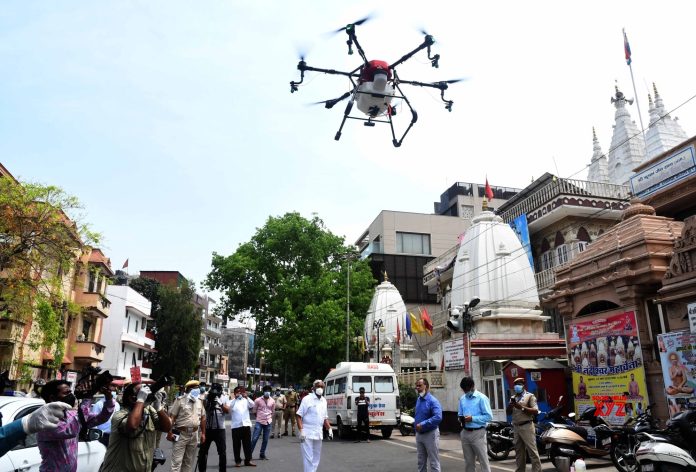Taking help of technology in its fight against novel coronavirus, the civic and city administration have pressed drone service in Varanasi to santize the city including its congested and narrow lanes amid the lockdown.
Equipped with GPS and GSM based wireless cameras, the vehicles used for drone operations carry out the entire santizer spraying operations which are centrally monitored from the Kashi Integrated Command and Control Centre, now converted to COVID-19 War Room.
The district administration has engaged Garuda Aerospace Private Limited, a Chennai based company for spraying of sanitizer in the selected areas of Varanasi City, Prime Minister’s constituency, under Smart Cities Mission.
In view of limited options for transportation during lockdown period, these drones were specially airlifted from Chennai through Air-India Cargo flights with special permission from Ministry of Civil Aviation.
A total of seven-member team with two drones was made operational and trial runs were completed on April 17, 2020, according to the ministry official.
Spraying of sanitizer through drones is prioritized for hotspots and containment areas identified by the district administration/Chief Medical Officer.
This is followed by isolation areas, quarantined areas, shelter homes and other places where manual spraying is difficult. The areas where drones are to be deployed is decided by a team of Varanasi Nagar Nigam officials.
The drone team first visits the area planned to be sanitized for the day and makes a quick visual survey of the terrain, buildings and surroundings and chalks out a flight path to be followed by the drone.
The drone is then filled with the chemical solution consisting of 1 per cent Sodium Hypochlorite, [NaOCl], the drones is then calibrated and set ready to fly.
Drones are then flown using a remote-control device by the experienced drone pilots in the planned flight path, simultaneously spraying the sanitizer through its four nozzles.
After every flight (lasting approximately 15 to 20 minutes) the drones are called back for refilling the chemical and replacing the battery pack. The drones are then moved to the next location to resume the flying/spraying.
The flight path of the drones and the area covered are controlled and recorded in a hand held device with GIS maps on the backend which is plugged to the remote controller.
The Sanitary Inspector and other Team members’ report to the Nodal officer before and after drone operations are carried out at each designated location.
The capital costs of the equipment are provided by the agency concerned, and the city administration had to incur expenditure on operational expenses (service costs and chemical costs). The average cost of operations range from Rs 8000 to Rs 12000 per day per drone and is dependent on area covered in acres.
Drones are unmanned vehicles which can fly the way helicopters do and can be operated by trained personnel using specially designed remote control.
Drones which were specially designed for spraying pesticides for agricultural use are now being used for spraying disinfectant fluid around quarantined areas and isolation wards during COVID-19 pandemic situation.


